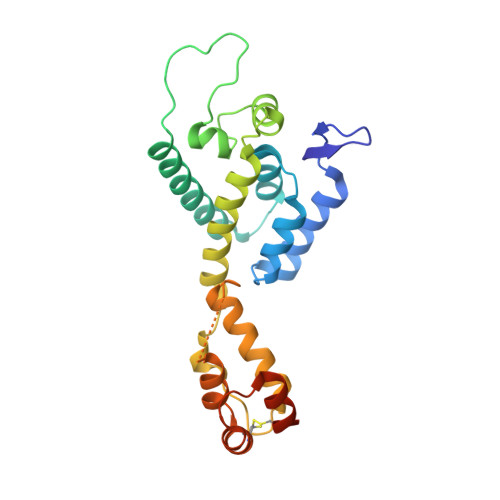HIV-1 Resistance to the Capsid-Targeting Inhibitor PF74 Results in Altered Dependence on Host Factors Required for Virus Nuclear Entry.
Zhou, J., Price, A.J., Halambage, U.D., James, L.C., Aiken, C.(2015) J Virol 89: 9068-9079
- PubMed: 26109731
- DOI: https://doi.org/10.1128/JVI.00340-15
- Primary Citation of Related Structures:
4XRO, 4XRQ - PubMed Abstract:
During HIV-1 infection of cells, the viral capsid plays critical roles in reverse transcription and nuclear entry of the virus. The capsid-targeting small molecule PF74 inhibits HIV-1 at early stages of infection. HIV-1 resistance to PF74 is complex, requiring multiple amino acid substitutions in the viral CA protein. Here we report the identification and analysis of a novel PF74-resistant mutant encoding amino acid changes in both domains of CA, three of which are near the pocket where PF74 binds. Interestingly, the mutant virus retained partial PF74 binding, and its replication was stimulated by the compound. The mutant capsid structure was not significantly perturbed by binding of PF74; rather, the mutations inhibited capsid interactions with CPSF6 and Nup153 and altered HIV-1 dependence on these host factors and on TNPO3. Moreover, the replication of the mutant virus was markedly impaired in activated primary CD4(+) T cells and macrophages. Our results suggest that HIV-1 escapes a capsid-targeting small molecule inhibitor by altering the virus's dependence on host factors normally required for entry into the nucleus. They further imply that clinical resistance to inhibitors targeting the PF74 binding pocket is likely to be strongly limited by functional constraints on HIV-1 evolution. The HIV-1 capsid plays critical roles in early steps of infection and is an attractive target for therapy. Here we show that selection for resistance to a capsid-targeting small molecule inhibitor can result in viral dependence on the compound. The mutant virus was debilitated in primary T cells and macrophages--cellular targets of infection in vivo. The mutations also altered the virus's dependence on cellular factors that are normally required for HIV-1 entry into the nucleus. This work provides new information regarding mechanisms of HIV-1 resistance that should be useful in efforts to develop clinically useful drugs targeting the HIV-1 capsid.
Organizational Affiliation:
Department of Pathology, Microbiology and Immunology, Vanderbilt University School of Medicine, Nashville, Tennessee, USA.















